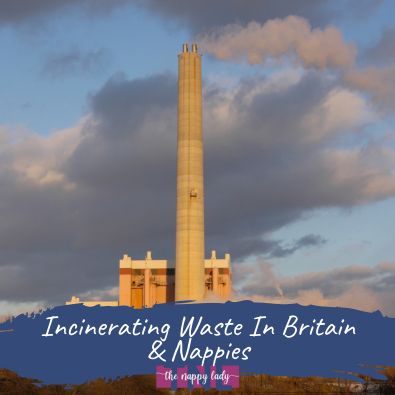Incinerating Waste In Britain & Nappies

Did you see in the news this week that analysis by the BBC has shown that burning household rubbish (which will include disposable nappies) is now the dirtiest way the UK generates power?
I was really pleased to see incineration being discussed in the mass media. One of the counter arguments i'm often presented with by disposable nappies supporters, is that burning disposable nappies is "good." By incinerating disposables they'll no longer sit in landfill for 500 years+ and instead disposable nappies are generating energy for the UK. So they aren't being wasted and therefore they have "less" environmental impact.
Incineration of nappies was a key part of the recent Life Cycle Analysis into the disposable nappies v reusable nappies debate.
How did we end up in this mess?
"Nearly 15 years ago, the government became seriously concerned with the gases being produced from throwing away household rubbish in landfill and their contribution to climate change. In response, it hiked the taxes UK councils paid for burying waste. Facing massive bills, councils turned to energy-from-waste plants - a type of incinerator that produces electricity from burning rubbish." BBC News
Increasing number of incinerators
The BBC analysis showed that "The number of incinerators surged - in the past five years the number in England alone has risen from 38 to 52." BBC analysis also shows that deprived areas such as "such as Runcorn, which are 10 times more likely to have an energy-from-waste incinerator in their midst than in the wealthiest areas."
Incineration was meant to be the "green alternative to landfill waste" and the BBC found that is the case for food waste which produces fewer greenhouse gases when it is burnt but it is not the same for plastic waste.
All disposable nappies will contain some form of plastic. BBIA found that it takes 1 cup of crude oil to make the plastic for just one single use disposable nappy. "Plastic is made of fossil fuels and burning it, rather than burying it in landfill, produces high levels of greenhouse gases. "It is the dirtiest type of waste to burn." BBC News
Impact of incineration on our climate
The BBC quoted Dr Ian Williams, professor applied environmental science at the University of Southampton as saying it's an “insane situation”, “Increasing [incinerators] use is disastrous for our climate."
The LCA found that reusable cloth nappies produce 25% less CO2 than single-use disposable nappies from production and end of life. Reusable nappies therefore have a lower global warming potential.
Key Facts
The BBC examined five years of data from across the country, and found that burning waste produces the same amount of greenhouse gases for each unit of energy as coal power.
According to the government’s own statistics, burning plastic produces 175 times more carbon dioxide (CO2) than burying it in landfill.
- The environmental impact of disposal of a single-use nappy is nine times higher than for that of a reusable nappy. (LCA2023)
Impact of incineration on our air quality
The BBC analysis found that there have been increasing breaches of air quality control across England between 2019 and 2023 for gases including carbon monoxide. "Last year 73% of facilities in England reported transgressions."
It's not only the burning of waste that is impacting our climate and air quality.
Moving the waste to the incinerator plants by train and road is adding further carbon emmissions to an already dirty business. Waste is not staying local. The BBC report found "waste from Derby City Council and Derbyshire Council ended up at 19 different incinerators in one year - from Milton Keynes to North Yorkshire."
Is incineration stopping us recycling?
Lord Deben the Conservative environmental minister told the BBC "“We’ve got too many [incinerators], and we shouldn’t have any more… they begin to distort our ability to recycle.”
Recycling rates have been stuck at around 41% for the last 10 years. Wales is the only nation to have hit the 65% recycling target set by the Conservative government. BBC News
Did you know?
Reusable nappies use 97.5% less raw materials than disposables - 2.5 years of disposables use 128.36Kg v reusables use 3.22Kg
But what about eco-disposable nappies?
Some eco-disposable nappy brands make claims that they are biodegradable. These eco-disposables often come at a premium price too.
Remember if you use any disposable nappies in the UK including "eco-disposable nappies" they are highly likely to end up in these dirty incinators.
Reduce, Reuse & Recycle
We need to consume less! Reusable nappies help us reduce how much we use.
Reduce - Reusable nappies reduce the impact for a constant supply of new consumerable single use nappies
Reuse - Reusable nappies you use, wash, reuse. Not just for one baby but subsequent siblings or sell them on to others.
Recycle - Reusable nappies at the end of their life can be recycled in fabric recycling banks.
Links to the original BBC News articles the data is from.
BBC 15th Oct 2024
